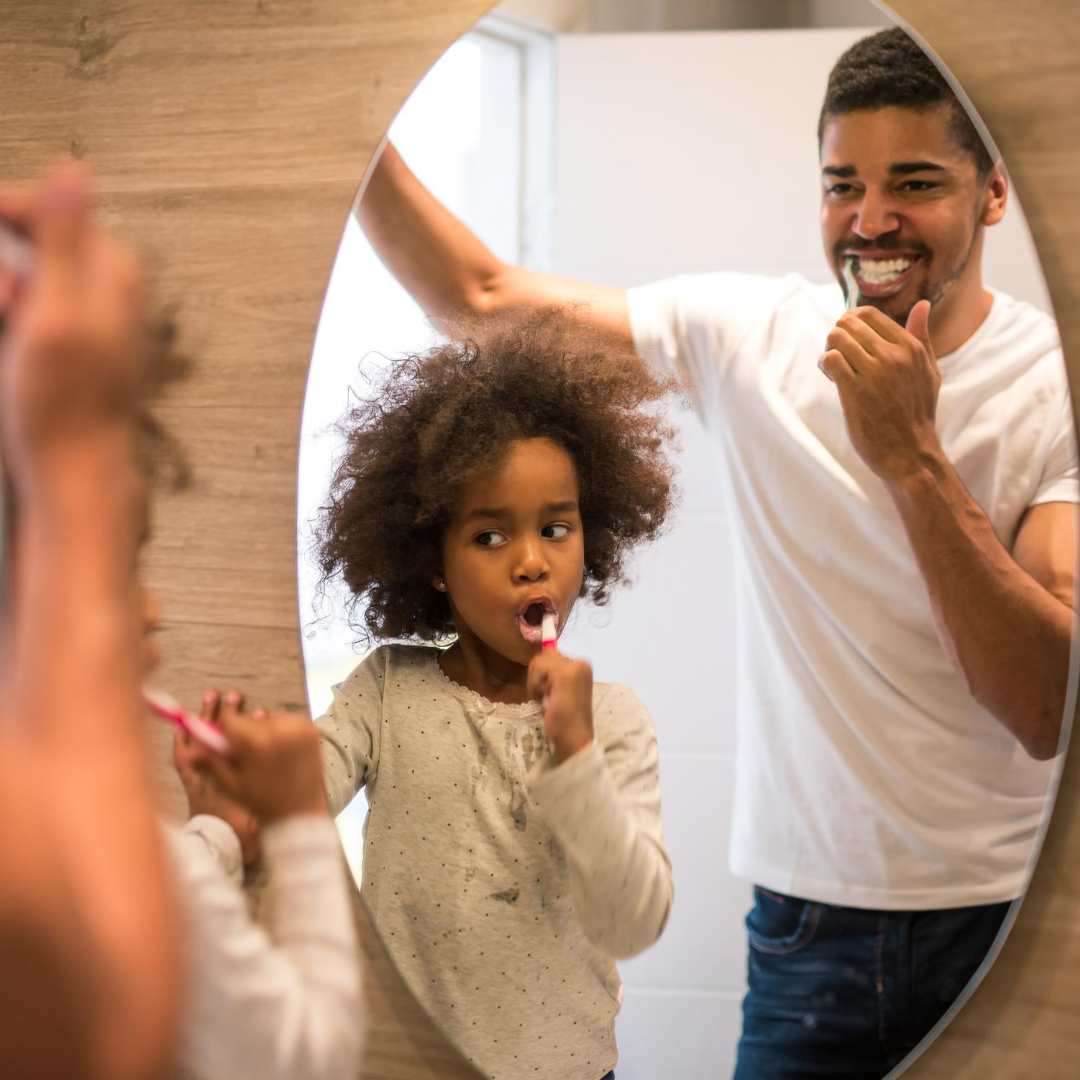Cleaning my teeth!
Written by Claire Burgess, Family Consultant
Helping children to make brushing their teeth into a twice daily habit is something which will ensure that they have healthy teeth (and hopefully no fillings!) for their whole lives. It is not always the easiest thing to get children to do, there can be resistance and I have seen some parents running around the house with a toothbrush in their hand chasing their child to try and get their teeth clean! In this blog I will give you some practical and helpful hints on how to have a quick and effective teeth cleaning routine.
When should I start to brush my child’s teeth?
You should start brushing your baby's teeth as soon as you can see their first milk tooth breaking through - this is usually at around 6 months old, but it might be earlier or later. As children get older and start to be able to brush their own teeth, parents or carers should continue to supervise toothbrushing.
What should I use to clean my child's teeth?
To start with, a soft bristled small baby toothbrush is best (you can easily find these in the chemist or supermarket) - see some examples here. Then, as the children get older, you can start to use bigger toothbrushes. Use a children's fluoride toothpaste containing no less than 1,000ppm of fluoride (check the label) or family toothpaste containing between 1,350ppm and 1,500ppm fluoride. Only use a smear of toothpaste at first for babies and then a pea sized amount for 3 years and up. Make sure that the children don't eat or lick toothpaste from the tube. Children who eat toothpaste can have too much fluoride and this can have a negative effect on the teeth so this does need to be avoided.
Where should I brush my children’s teeth?
It is best for children to stand by a sink in the bathroom to brush their teeth, ideally looking in a mirror so that they can see what they are doing. Sometimes people think a good time to do teeth cleaning is when children are in the bath, but there are lots of other distractions at bath time and teeth cleaning needs our full attention! Don’t forget that your child needs to see it as something that is normal and part of every day. Do they see you brushing your teeth? We are role models for our children, and they will want to copy us, so standing together at the sink, cleaning teeth together can often help with this process and make it become more accepted by your child.
How often should I clean my child’s teeth?
You should brush your children’s teeth twice daily for about 2 minutes – the best times to do this are last thing at night before bed, after having had their milk or bedtime drink / snack, and on 1 other occasion (usually after breakfast in the morning). Try to have a routine to teeth brushing so that it's an expectation and predictable for your child, this will help to become the norm every day.
How do I clean my child’s teeth?
Start as young as possible and for babies and toddlers, sitting with them on your lap with their head against your chest can be the best position. As they get older get them to stand in front of you and kneel in front of them so that you can see what they are doing. If you can be in front of a mirror this can be helpful as then both you and your child can see what you are doing!
Clean the teeth in small circular movements, across all the teeth. You do not need to get your child to rinse with water as this actually removes the fluoride so just getting them to spit out the toothpaste out is enough.
When should I take my child to the dentist?
NHS dental treatment for children is free and it is recommended that you start to take your child to the dentist before they are 1. If it’s practical you could also take your child with you when you go for your own dental appointments so that they get used to the idea of going.
What can I do if my child won’t brush their teeth?
This is always a tricky one because brushing teeth is so important, but we need to treat this in the same way that we treat anything else that we want our children to do (but they don’t want to!).
The first thing is to try and keep calm about it and perhaps lower your expectations. Anything is better than nothing and if you need to build up from them just chewing the brush – go with it!
Avoid holding or pinning your child down to brush their teeth, this can cause a negative association to the whole process and can lead to greater resistance each time teeth brushing needs to happen.
Toothpaste:
Some children find the mint flavour toothpaste too much and can refer to it as ‘spicy’ or similar. Some children don’t like the foaming of the toothpaste as they brush, however this can be eliminated by using other toothpastes which are different flavours or flavourless or don’t foam! Here are some examples.
Some of the supermarket own brands are fruit flavoured and have the right amount of fluoride for their age.
Here are some hints and tips to try and help encourage the reluctant brusher:
Get them involved – take them shopping and let them pick their own toothbrush and toothpaste (if they are going to use the children’s version).
Build toothbrushing into your routine so that they know it always happens at a certain time. For example: bath, story, teeth brushing, bed.
Build up the excitement – make it a fun part of their routine rather than a chore.
Help to promote their independence - perhaps try a toddler sink to help (an example is here)
Play copycat – use a mirror and let them brush their teeth while you brush yours or even let them brush your teeth while you brush theirs!
Take turns – let them have a turn at brushing their own teeth and then you take your turn.
If they’re old enough (at least 3 years old) perhaps try a (child appropriate) battery powered toothbrush– you can find ones that light up, or play music.
Make it fun – sing songs or check for things that might be ‘hiding’ in their teeth. Pretend you can’t find their mouth, or pretend the toothbrush is an aeroplane / animal - whatever works!
Practice through play – let them try brushing teddy’s teeth or play ‘dentists’ with them.
Sing songs - there are some teeth brushing songs and apps (Brush DJ), along with episodes with cartoon characters (Hey Duggee) on the topic of teeth brushing. If your child has a favourite song at the time then look to play this and they have to brush their teeth for the length of the time of the song, these are very often around 2 minutes which is perfect!
Try a timer – something new and exciting like a sand timer (you might already use a timer to help with behaviour) could give them the incentive they need to keep brushing.
Have books which talk about teeth cleaning - some ideas are here
Read this poem :)
As with all things, when you make progress, however small, give the children lots of praise! With all of these things in place you will be surprised how quickly brushing teeth becomes part of a natural routine.
Other things I can do to help my child’s teeth:
Avoid continuous snacking throughout the day, when eating, the ph in the mouth increases which leads to teeth becoming more vulnerable to decay. If you are going to give a snack to your child, look for this to be at a point in the day where they sit down, eat the snack over a 10/15 min period and then that it is it until the next meal. By doing this after 20 mins the ph levels return to normal, if your child continuously grazes between meals or prolongs snack time the ph levels remain higher which you want to avoid.
Try to avoid sugary foods and snacks.
Encourage your child to drink from a free flow cup or open cup where possible and keep fluids to just water or milk.
Avoid letting your child walk around or just sit chewing on a toothbrush -if they were to fall or push the brush too far back in their mouth, they could cause a serious injury to themselves. It is also important for them not to see the toothbrush as toy, but as something that is used twice a day for 2 mins and for teeth brushing only.
While you are here have a look at our video guides (webinars) on various topics including behaviour, sleep, play, toilet training and more - click here.
Don’t forget that we offer parent consultations should you need support with anything from sleep to behaviour and so much more! Details of the packages we offer can be found here.
We also have a podcast - ‘Newborn to Teen and Everything in Between’ - listen here.
This blog contains affiliate links.




